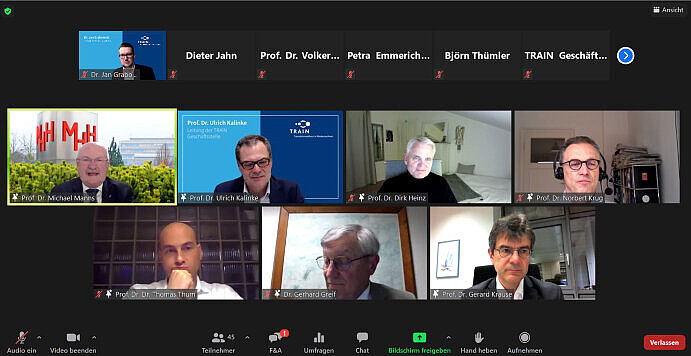On Wednesday, April 28, 2021, the Translational Alliance in Lower Saxony (TRAIN) had invited to the Parliamentary Evening. Due to corona-related contact restrictions, the event on the topic of "Infection Research in Lower Saxony in Times of the Corona Pandemic" could not take place on site in the state parliament as usual, but was realized as a webinar.
The evening was opened by Professor Dr. Ulrich Kalinke, head of the TRAIN office, with a short welcome speech. In her welcoming address, Petra Emmerich-Kopatsch, Vice President of the Lower Saxony State Parliament, emphasized the importance of cooperation between the various research institutions in Lower Saxony, especially now in the currently prevailing corona pandemic. Björn Thümler, Lower Saxony's Minister for Science and Culture, thanked the scientists for their tireless efforts in researching the coronavirus and for communicating the results of their research to the public.
Subsequently, the heads of the TRAIN partner institutions Hanover Medical School, Professor Dr. Michael P. Manns, Helmholtz Centre for Infection Research, Professor Dr. Dirk Heinz, and Hanover University of Veterinary Medicine Foundation, Dr. Gerhard Greif, presented the activities of their research institutions. Time and again, the contributions also highlighted joint projects from the various perspectives. The epidemiologist Professor Dr. Gerárd Krause presented current results from corona research in a short lecture. For the panel discussion at the end of the evening, the round of discussants was further complemented by the President of Leibniz Universität Hannover, Professor Dr. Volker Epping, as well as by the directors of Fraunhofer ITEM, Professor Dr. Norbert Krug and Professor Dr. Thomas Thum. The participating parliamentarians took the opportunity to ask questions to learn more about networking in infection research in Lower Saxony.
As much as the results achieved so far were appreciated, the discussion showed that the already existing environment provides an ideal breeding ground to cooperate even more interdisciplinary and even more intensively between the sites in Braunschweig, Göttingen and Hannover in the field of infection research.



